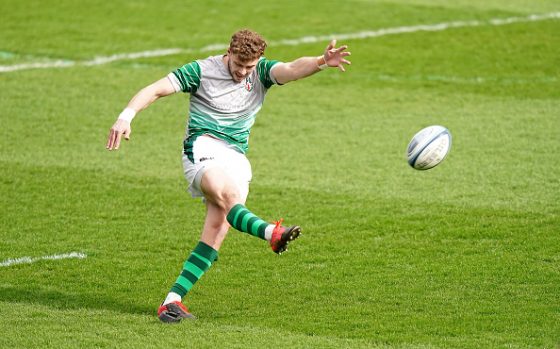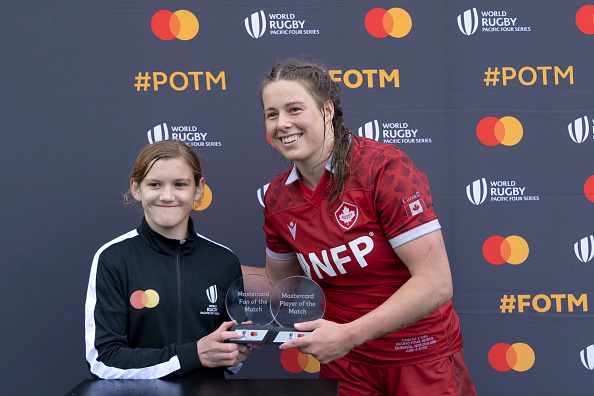INTERVIEW – Hanging up your boots is a sad time for many rugby players. But how must it feel for professionals, who can no longer play their cherished sport for a living? We spoke with Theo Brophy-Clews, a former England U20 international who played over 60 games for London Irish.
He was forced to retire at just 24 years old after an unfortunate series of concussions. But after a year of adjustment, his stoic approach offers a wise perspective
Former London Irish back on retiring at the age of 24.
It’s been about a year since Brophy-Clews had his last training session with his London Irish teammates. As time goes on, the adjustment seems to have gotten easier.
“It’s been the happiest I’ve been in terms of not identifying as a rugby player. It’s just nice because you don’t feel like you’re constantly living off the back of something you’ve done. There was a period when I thought ‘I don’t want anything to do with rugby’. But there are periods when I’m like ‘you know what, I’m really proud of what I was’… It’s been hard to move through it, I’m still doing it”.
Theo explains how there are various aspects of life that change when leaving professional rugby: “I was holding onto the idea that I was going to be as big and strong as when I was playing. But I’m not. And I accepted my body was going to change. There’s also having to learn how to live on less money. There are certain things you get used to… you find you don’t have this pressure to buy stuff, do things, be in certain places.“
“You can’t expect things not to change… there’s constant change. Things will change, and that’s fine”.
(above image: London Irish vs Worcester Warriors – one of Brophy-Clews’ last games for the club.)
From London Irish jerseys to Psychology books
Conversations with Mike Roberts, the sports psychologist at London Irish, led Theo down the psychology route. He has just completed the first year of his Psychology Masters and works for a mental health charity.
“Through the concussions, I’m really into brain health, how your brain works, and different things that can help your brain function well”.
When it comes to concussions- which ultimately cut his career short- Theo just wants young players to be educated.
“It’s going to continue being an issue in rugby for as long as it’s a sport. It’s a full-contact sport, you’re gonna get hit in the head… I’d say some (red and yellow) cards lack an awareness of how the game works.
“But people say ‘well you chose to be a rugby player’, but it doesn’t really feel like an active choice. Like, you’re good at rugby when you’re young, so of course it’s what you want to do…
“I just think players need to know what they’re getting into”.
Theo on learning to appreciate ‘normalness’
Theo has plenty of fond memories of professional rugby. His nostalgia predominantly stems from the little moments, like cracking jokes with his teammates, or the hard graft leading up to a victory. He still relishes physical challenges in life, having just completed The Roc endurance race (think triathlon, but mountainous!). But he has found himself needing to relax a little more with life after rugby:
“In rugby, I could show you the last 4 years written down (apart from the five weeks in the off-season); what I did every day. So there’s a craving for structure. And there’s a craving for the challenge.
“I’m trying to not have something that’s big and shiny to work towards. On a biological level, constantly doing that is not particularly good for you. With the triathlon, I was going on about it all the time, and you attach your identity to that. I’m getting used to the idea that it’s ok not to be doing something that’s crazy or big. To appreciate normalness”.
View this post on Instagram
Personal advice for those experiencing change
Theo cites journaling as an effective tool, but believes getting support, and supporting others are so important: “Speaking to a therapist, whilst not financially available for everyone, is great because it gives you a chance to reflect and have someone to bounce ideas off. Failing that, friends who are good at just holding space for you.
“Leaning on people in your life is really important. If you do these transition things by yourself, you just end up thinking too much”.
Before concluding the interview, Theo was clear that he wanted to emphasise the positives rugby gives people. “Mental health in rugby is only spoken about when stuff goes wrong. There is a lack of awareness about things that lead to good mental health. It’s easy to ignore the good stuff because there’s so much going on, so many challenges…“
“But not just in my life, there are many people that rugby gives so much benefit to. It’s amazing for people”.
This is certainly a point worth remembering, especially in the context of rugby’s mental health issues. The concussions and forced retirement would have rocked Theo during the last year. But the fact he emphasized the positives of rugby for mental health speaks volumes. As a sport, it must strive to improve mental health in rugby, but never forget how the game also helped so many in the first place.
Main Photo Credit:
Embed from Getty Images



